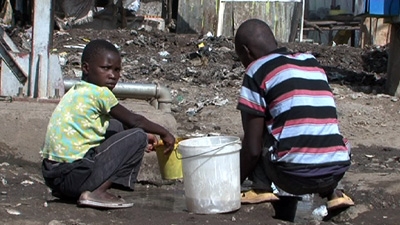Kayole Soweto village in the outskirts of Nairobi is home to 90,000 residents. The village is among scores of informal settlements inhabited by almost two-thirds of the city’s four million people. Like other low-income settlements in Nairobi, Kayole Soweto village is sparsely served by piped water network.
A pilot social connections program with an innovative micro-financing model could hold the solution for improving access to affordable drinking water and sewerage services for low-income, underserved areas in Kenyan towns and cities, such as Kayole Soweto.
Most residents are willing to pay for improved water supply, but cannot afford the lump sum KSh8,125 (US$100) fee required by the Nairobi City Water and Sewerage Company (NCWSC) to install metered water connection in individual houses. The connection fee includes a non-refundable commitment fee, deposit for water meter, and costs of piping and fittings.
As a result, the majority of households are served by water kiosks and boreholes, for which they pay up to 10 times the tariff charged by the NCWSC in other parts of the city. Most households rely on water sources more than 100 meters away. The burden of fetching water is usually borne by women and children, though not always. For Isaac Ndirangu, 18, a high school student, the responsibility of fetching water falls on him as he is the eldest sibling in a household of four people. “During periods of extreme water shortage, I have to walk to a nearby suburb two kilometers away to fetch water at KSh50 (US60 cents) per 20-litre container,” Isaac says.
The village also lacks sewers and wastewater collection systems, posing serious health risks to the community. According to Peter Ngugi, the local administrator in charge of the district, “more than 80 percent of illnesses in this locale are linked to contaminated water.”
Increasing Water Access in Informal Settlements
In early 2012, the Kenya government received an additional $300 million credit from the World Bank’s International Development Association (IDA) to increase access to water and sanitation services in fast-growing cities and towns, including Nairobi.
The expanded Water and Sanitation Services Improvement Project (WASSIP) is focused on extending water infrastructure to informal settlements and other underserved areas often populated by low-income and marginalized communities. So far, 18 kilometers of the water network were installed within Kayole Soweto village.
A social connections program introduced by the World Bank’s Water and Sanitation Program (WSP) now makes it affordable for Kayole Soweto residents to tap piped water from the network to communal residences.
The program enables low-income households to come together to borrow the money needed for the initial cost of installing a metered stand pipe within their residential compound.
“A flexible repayment scheme designed to suit the fluctuating incomes of self-employed and informal sector earners also allows the households to pay off the loan in installments together with the monthly water bill over an agreed period,” says Philip Gichuki, NCWSC Managing Director.
The micro-loans are accessible to newly-signed up customers of NCWSC through an arrangement with a local micro-finance bank. Upon connection to the piped water network, the beneficiaries are entitled to a 50 percent rebate through an output subsidy from the World Bank’s Global Partnership on Output-based Aid (GPOBA).
“So far, more than 1,500 households have signed up to the scheme: our target is to connect 2,200 households by February 2013,” says Gichuki.
The next phase will focus on installing a sewer network.
Right to Water
The initiative is a response to Kenya’s new constitutional right to safe water and sanitation for all citizens, which means service providers must also focus on underserved communities.
“Water authorities and service providers must now be innovative and pragmatic in order to realize access to affordable water services on a non-discriminatory basis, especially for disadvantaged or marginalized groups,” says David Stower, permanent secretary in the Ministry of Water and Irrigation.
WSP is also supporting NCWSC to develop an ICT platform through which consumers can use their mobile phones to transact water businesses. It is now possible to query water bills by sending water meter readings on phone, and to pay instantly using mobile money.
“Besides the time savings realized by bringing water services closer to informal settlements, households can also save the time and effort of travelling far to settle a water bill,” says Gichuki.
“These innovations hold promise for scaling up improved water and sanitation services to other informal settlements in urban Kenya,” says Johannes Zutt, World Bank Country Director in Kenya.
WSP is extending the social connections program to reach more than 300,000 low-income residents in other under-served informal settlements in Nairobi.

